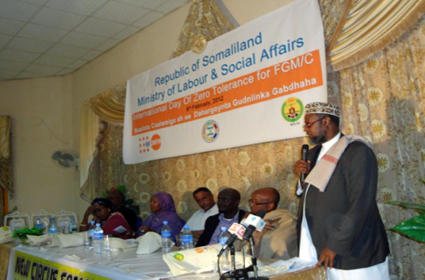The International Day of Zero Tolerance to Female Genital Mutilation/Cutting (FGM/C) was marked with commemorations in all UNFPA sub-offices in Somalia in collaboration with UNICEF. Most of the event was followed by Health Cluster members, donors and stakeholders through a video-conferance in Nairobi, Kenya.
- It is a great honor to welcome you, said UNFPA Deputy Representative Rogaia Abdelrahim when she opened one of the four conferences held on the 6 of February to commemorate the International Day of Zero Tolerance of Female Genital Mutilation/Cutting.
- Every year over three million girls and women - or some 8000 girls each day - face the risk of genital mutilation and cutting. Worldwide 100 to 140 millions have already undergone female genital mutilation /cutting. It has become a global problem requiring immediate and targeted solutions. Somalia is no exceptions, said Abdelrahim.
While Somalia still has one of the highest prevalence of FGM/C in the world, an estimated proportion of people that are now aware of the harmful effects through awareness campaigns is higher than ever. The issue of abandonment has expanded and become integrated into reproductive health policies, planning and programming during the last year. Two decrees outlawing all form of FGM/C in Puntland and Somaliland has been developed. In Puntland the decree was approved by the Cabinet but still awaits approval from the parliamentarians.
- Consultations are in progress with professional Nurses, Midwifes and Doctors Associations to come up with a policy banning all forms of FGM/C among the members, said Abdelrahim.

In Somaliland the draft policy on eradicating FGM/C was presented during an event held in Hargeisa that same evening. A group of Ministers, women organizations, youth organizations, FGM/C exercisers, poets, religious leaders, media and NGO's attended the ceremony where the policy was presented in Somali and English language.
- Many people justify FGM/C with Islamic religion, but it has no religious grounds and should be abandoned. I promise that in collaboration with my government and the local community I will dare to stop FGM/C in Somaliland while I am in office, said the Minister of Religion Sheikh Khalil Abdi.
Somaliland Y-PEER network performed acrobatics play and drama for entertainment and awareness rising. Apart from that, each of the 250 participants received a well designed bag containing a T-shirt and Posters with marks of the event- Zero tolerance for FGM/C.
In Galkayo, over 60 persons attended the commemoration with invited guest speakers from Galmudug Authority, Women Focal Point and religious elders. The event was followed by radio debates regarding the consequences of FGM for during and after the practice. The debate was presented with past experiences, and the pushing factors which encourages the practice.
UNFPA Garowe office with UN and NGO partners participated in a video conference with the Reproductive Health working group in Nairobi. The Ministry of Health and the Ministry of Women Development and Social Affairs they presented their activities on FGM/C in Puntland and focused on the FGM/C decree that stills needs the signature of the president.
Despite the challenging security situation in Mogadishu UNFPA managed to commemorate the Zero Tolerance Day by moving the event indoor, instead of marching outside. Around 100 persons attended the event where the Ministry of Women and Family Affairs and Sheikh Sharif Ibrahim was some of the honorable guests. The event was widely covered in Somali radio and television.
-Despite some success, the overall rate of decline in the prevalence of FGM/C has been slow. It is therefore a global imperative to strengthen the work for elimination of this harmful practice, which is essential for reaching many of the Millennium Development Goals, said UNFPA Dep. Rep. Rogaia Abdelrahim at the end of her opening speech.
Seen from a human rights perspective, the practice reflects deep-rooted inequality between the sexes, and constitutes an extreme form of discrimination against women. FGM/C is nearly always carried out on minors and is therefore a violation of the right of child.

